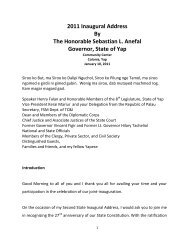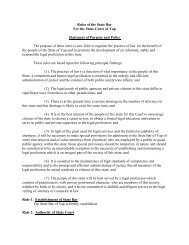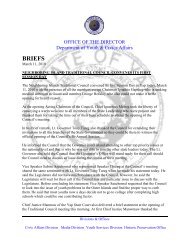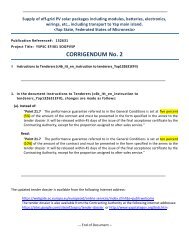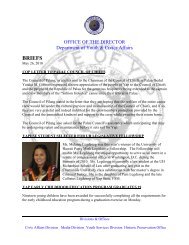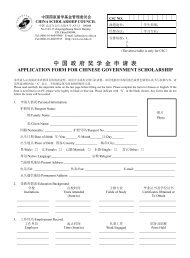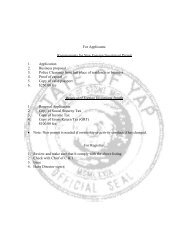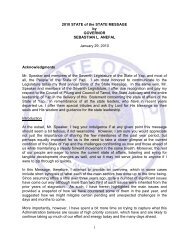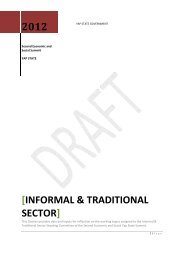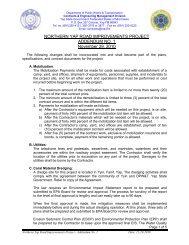RULES OF CIVIL PROCEDURE For the Trial Division of the Yap ...
RULES OF CIVIL PROCEDURE For the Trial Division of the Yap ...
RULES OF CIVIL PROCEDURE For the Trial Division of the Yap ...
Create successful ePaper yourself
Turn your PDF publications into a flip-book with our unique Google optimized e-Paper software.
determine <strong>the</strong>m and render judgment against <strong>the</strong> plaintiff or may decline to render any<br />
judgment until <strong>the</strong> close <strong>of</strong> all <strong>the</strong> evidence. If <strong>the</strong> court renders judgment on <strong>the</strong> merits<br />
against <strong>the</strong> plaintiff, <strong>the</strong> court shall make findings as provided in Rule 52(a). Unless <strong>the</strong><br />
court in its order for dismissal o<strong>the</strong>rwise specified, a dismissal under this subdivision and<br />
any dismissal not provided for in this rule, o<strong>the</strong>r than a dismissal for lack <strong>of</strong> jurisdiction,<br />
for improper venue, or for failure to join a party under Rule 19, operates as judgment<br />
upon <strong>the</strong> merits.<br />
(c) Dismissal <strong>of</strong> Counterclaim Cross-Claim or Third Party Claim.<br />
The provisions <strong>of</strong> this rule apply to <strong>the</strong> dismissal <strong>of</strong> any counterclaim, cross-claim, or<br />
third-party claim. A voluntary dismissal by <strong>the</strong> claimant alone pursuant to paragraph (1)<br />
<strong>of</strong> subdivision (a) <strong>of</strong> this rule shall be made before a responsive pleading is served or, if<br />
<strong>the</strong>re is none, before <strong>the</strong> introduction <strong>of</strong> evidence at <strong>the</strong> trial or hearing.<br />
(d) Costs <strong>of</strong> Previously-Dismissed Action. If a plaintiff who has once dismissed an<br />
action in state court commences an action based upon or including <strong>the</strong> same claim against<br />
<strong>the</strong> same defendant, <strong>the</strong> court may make such order for <strong>the</strong> payment <strong>of</strong> costs <strong>of</strong> <strong>the</strong> action<br />
previously dismissed as it may deem proper and may stay <strong>the</strong> proceedings in <strong>the</strong> action<br />
until <strong>the</strong> plaintiff has complied with <strong>the</strong> order.<br />
Rule 42. Consolidation; Separate <strong>Trial</strong>s.<br />
(a) Consolidation. When actions involving a common question <strong>of</strong> law or fact are<br />
pending before <strong>the</strong> court, it may order a joint hearing or trial <strong>of</strong> any or all <strong>the</strong> matters in<br />
issue in <strong>the</strong> actions; it may order all <strong>the</strong> actions consolidated; and it may make such<br />
orders concerning proceedings <strong>the</strong>rein as may tend to avoid unnecessary costs or delay.<br />
(b) Separate <strong>Trial</strong>s. The court, in fur<strong>the</strong>rance <strong>of</strong> convenience or to avoid prejudice,<br />
or when separate trials will be conducive to expedition and economy, may order a<br />
separate trial <strong>of</strong> any claim, cross-claim, counterclaim, or third-party claim, or <strong>of</strong> any<br />
separate issue or <strong>of</strong> any number <strong>of</strong> claims, cross-claims, counterclaims, third-party<br />
claims, or issues.<br />
Rule 43. Taking <strong>of</strong> Testimony.<br />
(a) <strong>For</strong>m. In all trials <strong>the</strong> testimony <strong>of</strong> witnesses shall be taken orally in open court,<br />
unless o<strong>the</strong>rwise provided by <strong>the</strong>se rules or by <strong>the</strong> Rules <strong>of</strong> Evidence.<br />
(b) Vacant. (Abrogated)<br />
(c) Vacant. (Recorded <strong>of</strong> Excluded Evidence - Abrogated)<br />
(d) Affirmation in Lieu <strong>of</strong> Oath. Whenever under <strong>the</strong>se rules an oath is required a<br />
solemn affirmation may be accepted in lieu <strong>the</strong>re<strong>of</strong>.<br />
(e) Evidence on Motions. When a motion is based on facts not appearing <strong>of</strong> record<br />
<strong>the</strong> court may hear <strong>the</strong> matter on affidavits presented by <strong>the</strong> respective parties, but <strong>the</strong>



